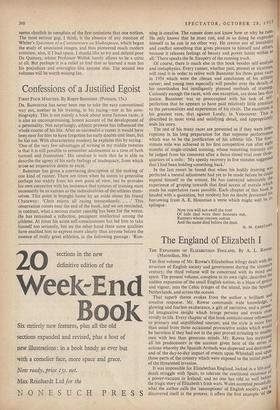Confessions of a Justified Egoist
FIRST FOUR MINUTES. By Roger Bannister. (Putnam, 15s.) DR. BANNISTER has never been one to take the easy conventional way out, neither in his training, in his racing—nor in his auto- biography. This is not merely a book about some famous races; it is also an uncompromising, honest account of the development of a personality. Not surprisingly, athletic prowess has influenced the whole course of his life. After so successful a career it would have been easy for him to have forgotten his early doubts and fears, but he gas not. With characteristic modesty he explains this by saying : `One of the very few advantages of writing in my middle twenties is that it is still possible to remember adolescence as a time of both turmoil and frustration.' His candour is such that he is able to describe the agony of his early feelings of inadequacy, from which arose an imperative desire to excel.
Bannister has given a convincing description of the making of one kind of runner. There are times when he seems to generalise perhaps too widely from his own point of view, but he provides his own corrective with his insistence that systems of training must necessarily be as various as the individualities of the athletes them- selves. This point is brought home' by an aside about his friend Chataway : 'Chris enjoys all racing tremendously. . . .' This observation comes near the end of the book, and we are reminded, in contrast, what a serious matter running has been for the writer. He has remained a reflective, percipient intellectual among the athletes. At times his acute self-consciousness has led him to take himself too seriously, but on the other hand these same qualities have enabled him to express more clearly than anyone before the essence of really great athletics, in the following passage: 'Run-
ning is creative. The runner does not know how or why he runs. He only knows that he must run, and in so doing he expresses himself as he can in no other way. He creates out of instabilitY and conflict something that gives pleasure to himself and others, because it releases feelings of beauty and power latent within us all.' There speaks the St. Exupery of the running track. Of course, there is much else in this book besides self-analysis and metaphysics. Every runner, whether past, present or vicarious, will read it in order to relive with- Bannister his three great race' in 1954 which were the climax and conclusion of his athletic career; and young men especially will ponder over the details of his unorthodox but intelligently planned methods of training' Curiously enough the races, with one exception, are done less than justice. Bannister was so preoccupied with his task of self' perfection that he appears to have paid relatively little attention to the personalities and experiences of his rivals. The exception is his greatest race, that against Landy, in Vancouver. This Is described in most vivid and satisfying detail, and appropriately ends his story. The rest of his many races are presented as if they were inter- ruptions in his long preparation for that supreme performance which was to be the justification of his athletic life. The for. minute mile was achieved in his first competitive run after eight months of single-minded training, whose mounting intensity can be judged from his comment after a fierce timed trial over three' quarters of a mile : 'My speedy recovery in five minutes suggested that I had been holding something back.' In the last resort he found that when his bodily training Wes, perfected a mental adjustment had yet to be made before he could expend himself to the utmost. He has conveyed admirably the experience of groping towards that final access of morale which made his superlative races possible. Each chapter of this book is headed with a quotation, but modesty has no doubt prevented his borrowing frond A. E. Housman a verse which might well be its epilogue :
Now you will not swell the rout Of lads that wore their honours out, Runners whom renown outran


































 Previous page
Previous page